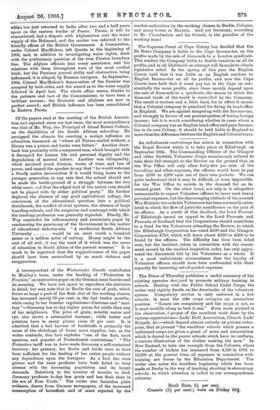A correspondent of the Westminster Gazette contributes to Monday's issue,
under the heading of "Protection in Practice," an instructive paper on the German meat famine and its meaning. We have not space to reproduce the statistics in detail, but may note that in Berlin the cost of pork, which forms so large a part of the flesh diet of the working classes, has increased nearly 50 per cent. in the last twelve months ; while owing to her frontier regulations—Customs and "sani- tary "—Germany has to-day higher prices for cattle than any of her neighbours. The price of grain, notably maize and rye, also shows a substantial increase ; while butter and potatoes have in many places risen 50 per cent. It is admitted that a bad harvest of foodstuffs is primarily the cause of the shrinkage of home meat supplies, but, as the writer contends, this fact explodes "one of the first, most specious, and popular of Protectionist contentions." "The Protective tariff was to have made Germany a self-contained territory : her granary, her flocks and herds were to have been sufficient for the feeding of her entire people without any dependence upon the foreigner. As a fact, the corn 'grower and the meat producer have both failed to keep abreast with the increasing population and its larger demands. Relatively to the number of mouths to feed, Germany • produces to-day less grain and less flesh than in the era of Free Trade." The writer also furnishes plain evidence, drawn from German newspapers, of the increased 'consumption of horseflesh and of meat rejected by the
market authorities by the working classes in Berlin, Cologne, and many towns in Bavaria. And yet Germany, according to Mr. Chamberlain and his friends, is the paradise of the working man !


































 Previous page
Previous page